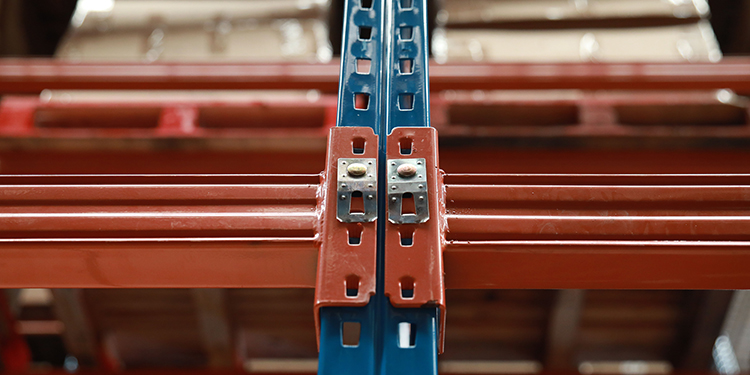Minimize The Risk Of Load Beam Disengagement With Locking Devices

To reduce the chance of a load beam becoming disengaged from the storage rack structure, rack manufacturers typically include locking clips, pins and/or bolts. They secure the connection of the beams to the upright columns at every point of contact to prevent an upward force applied by a lift truck’s forks (or a load) from accidentally disengaging the beam in the event of an impact.
Should a beam become disengaged, it will not be able to support the load capacity for which the system was engineered. The main risk posed by a disengaged beam is that loads resting on it will fall from the rack and possibly injure pedestrians or associates in the aisle.
Therefore, for the safety of the racking structure, other equipment, and the persons working in and around it, RMI’s ANSI MH16.1: Specification for the Design, Testing and Utilization of Industrial Steel Storage Racks calls for the installation of beam locking devices in section 5.4.2, stating:
Except for movable-shelf racks, beams subject to machine loading shall have connection locking devices (or bolts) capable of resisting an upward force of 1,000 pounds (453.6 kilograms) per connection without failure or disengagement.
Locking clips and/or bolts are typically included as a standard component from the racking system’s manufacturer and, as a safety best practice, should be applied at the time of installation. For an additional measure of safety, some installations — typically those in big box and warehouse stores with a lot of general public foot traffic — often use both clips and bolts together.
To verify their proper installation, as well as to confirm they have not been removed, distorted, or damaged, beam locking devices should be included as part of routine rack inspections. to confirm their proper installation and that they have not been removed or damaged. Any damaged or missing beam connector clips or bolts should be replaced immediately.
Need more details about beam-to-column connections? Section 5.4 of the ANSI MH16.1: Specification includes more details.


